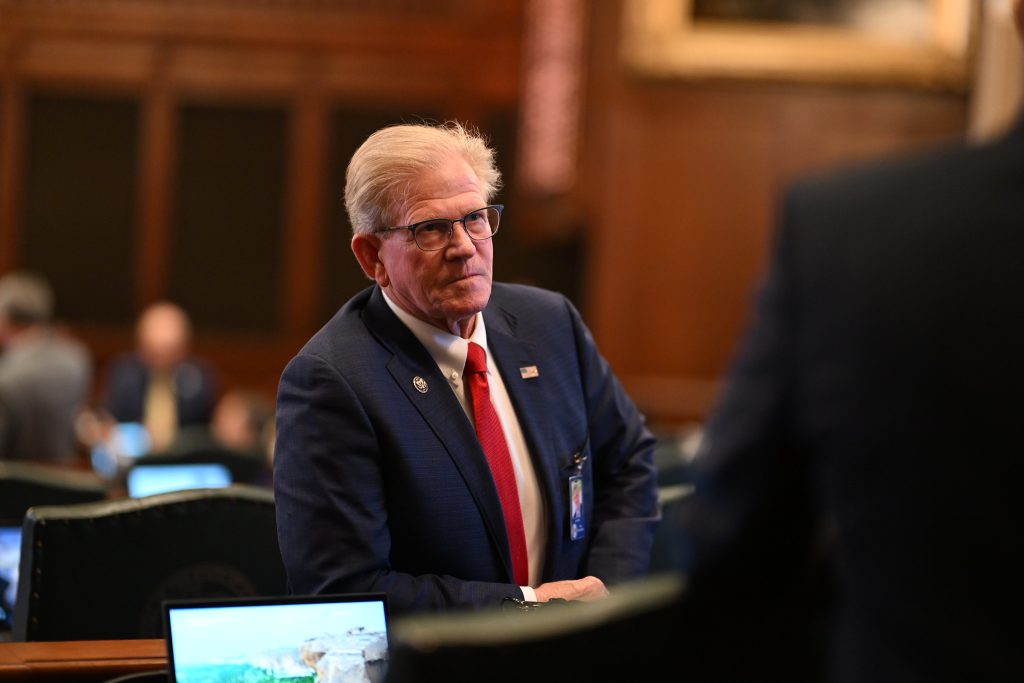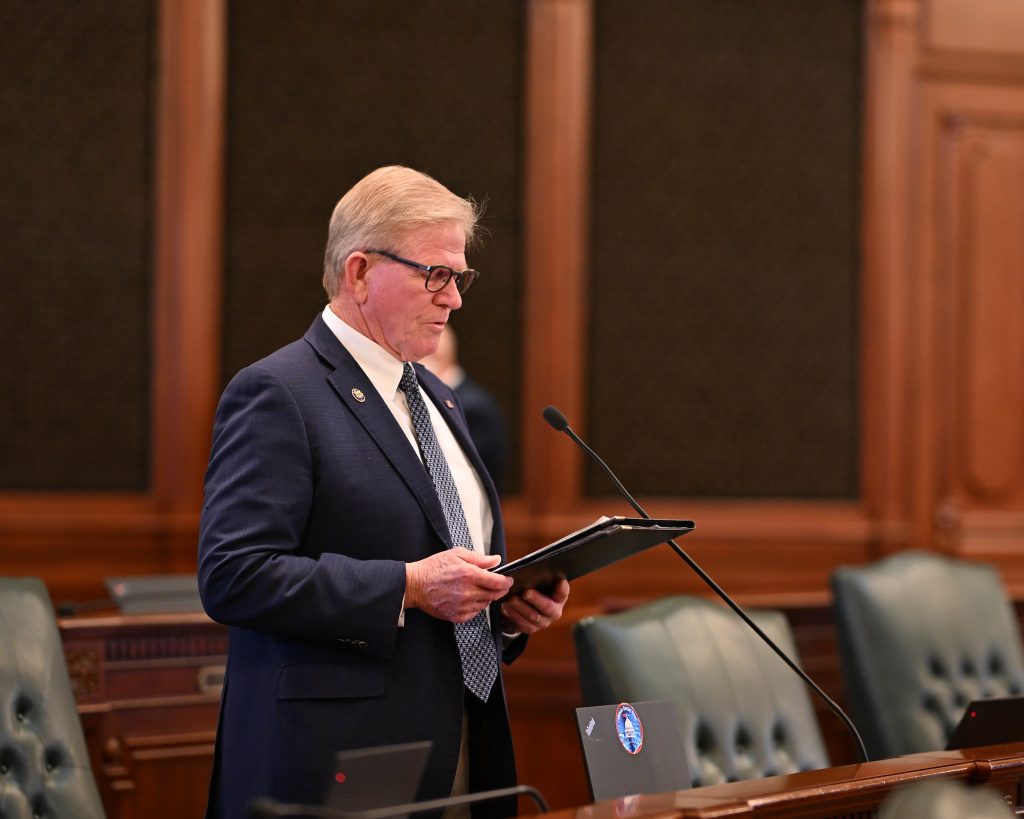BUDGET
House Republicans call for enactment of a $52.1 billion balanced State of Illinois budget for FY 2025. Under subsection (b) of Section 2 of Article VIII of the Illinois Constitution, appropriations for a fiscal year shall not exceed funds estimated by the General Assembly to be available during that year.

“Pritzker’s budget has increased by $13 billion since he took office, yet the borrowing, taxing, and spending continues. It’s the same playbook of making life worse for the hard-working taxpayers and businesses.”
Under subsection (a) of Section 4 of the Commission on Government Forecasting and Accountability Act, the House and Senate are directed, by joint resolution, to adopt or modify the Commission on Government Forecasting and Accountability’s State revenue estimates for the fiscal year as may be appropriate, and the estimate in the joint resolution is to constitute the General Assembly’s estimate, under paragraph (b) of Section 2 of Article VIII of the Constitution, of the funds estimated to be available during the next fiscal year.
Unfortunately, it has been a decade since the General Assembly followed the Constitution and State statutes by adopting a revenue estimate via joint resolution. In 2014 (FY 2015), HJR 100 set forth revenue estimates of $31.1 billion in total State revenue and $4.3 billion in federal revenue, for a total of $35.4 billion in estimated revenue.
In the Governor’s FY 2025 Budget Book, the Governor’s Office of Management and Budget (GOMB) projected an FY 2025 General Funds revenue total of $52.993 billion. In March, the Commission on Government Forecasting and Accountability (CGFA) published an FY 2025 revenue estimate of $52.077 billion, which is $916 million lower than GOMB’s estimate.
However, it should be stressed that CGFA’s revenue estimate is based on current law. The FY 2025 revenue projection from GOMB included a number of revenue adjustments (tax increases) in its calculation that would require changes to State law. The net value of these revenue adjustments is approximately $1.1 billion. The Governor’s proposed tax hikes face significant opposition from both parties in the General Assembly.
The Constitution authorizes the General Assembly to appropriate no more than $52.077 billion to meet the FY 2025 general funds spending commitments of the State of Illinois. In a Joint Resolution filed this week, HJR 72, Deputy Republican Leader Norine Hammond and the House Republican Caucus seek to adopt CGFA’s revenue estimate for FY 2025 and call upon the General Assembly to enact a budget that meets its Constitutional requirements.
STATE GOVERNMENT
State of Illinois to create new Department of Early Childhood. The new State department will specialize in early childhood programs currently within the Department of Children and Family Services (DCFS), the Illinois Department of Human Services (IDHS), and the Illinois State Board of Education (ISBE). Creation of the Department of Early Childhood, a process that will take place over a two-year period, is expected to enable the operation of a merged, integrated agency in FY27, starting in calendar year 2026.
Enactment of Senate Bill 1 to create the new Department of Early Childhood begins this transitional two-year period. During this time, certain offices within the existing Departments that are slated for transition to the new Department will prepare for the July 1, 2026 merger. The new Department will oversee early intervention services, home-visiting programs, child care and day care licensing, the administration of the child care assistance program, and the administration of the Preschool for All initiative.
The General Assembly is also preparing to appropriate $13 million to the new Department for FY25 expenses related to transition planning. Some House Republicans raised questions and concerns about allocating a massive sum of money to a transitional program for an interdepartmental Springfield merger that has not yet been fully planned. The House approved creation of the new Department on Thursday, May 9, by a vote of 93-18-0.
Lawsuit filed against alleged abuse at State juvenile justice centers. The lawsuit, filed this week, seeks substantial monetary damages for alleged acts of sexual abuse involving residents and detainees. Illinois juvenile justice centers are administered by licensed entities, counties, and by the State of Illinois, and include both outpatient and residential facilities. State-run residential detention facilities for juveniles are operated by the Illinois Department of Juvenile Justice (IDJJ).
IDJJ facilities in Illinois include those facilities for juvenile offenders that used to be called “boot camps.” They feature far less of the signs and elements of imprisonment than a prison for adults would have, but they are also places of detention. The lawsuit covering alleged acts of abuse covers year 1996 through 2017, during administrations operated by four separate Illinois governors. The law firm handling the Illinois case has also filed similar cases against state authorities in Maryland, New Jersey, and New York.
House Republicans speak out against continued licensing delays. The State agency that awards licenses to most professionals, the Department of Financial and Professional Regulation (DFPR), is slow to respond when Illinoisans apply for new licenses or move to renew existing licenses. This is a significant concern, because professionals need an up-to-date, current license in order to legally do the jobs for which they have been trained and educated. In addition, there are severe problems of legal liability when someone tries to practice a profession during a “bridge period” or “gray period” without a license, and these challenges extend outward to each unlicensed professional’s partners and co-workers.
In thousands of incidents reported to House Republican members and their legislative colleagues, Illinois residents have completed the licensure paperwork, sent money to DFPR, and then nothing happens for weeks. The Department explains that “we are backed up,” and further claims that they have been working for more than 12 months to install a new computer software program. The new program, when it is up and operating, is supposed to generate an automated process for Illinoisans to submit a license application or license renewal application to DFPR, and for DFPR to efficiently process the application.
However, as of May 2024 no actual operating program has emerged for this purpose at DFPR. Reports indicate that the U.S. software industry has problems with how DFPR operates, particularly the security of DFPR’s computer system, and does not want to sell or lease valuable intellectual property to a Department that operates what the industry considers to be insecure infrastructure. As of May 2024, none of DFPR’s licensure software modernization promises have been met and House Republican members grilled the Department’s head at a hearing held this week in Springfield.
INVEST IN KIDS
Democrats killed the Invest in Kids Program last year and refused to call the bill for a vote. Their lack of support to help low-income children receive quality education has resulted in about 10,000 students losing their scholarships to private schools.

“Supporting children, offering a chance at a better education, and a better life to kids in poverty should be a bipartisan issue. This is an easy decision to bring back the Invest in Kids scholarship program and I encourage my colleagues to do so.”
